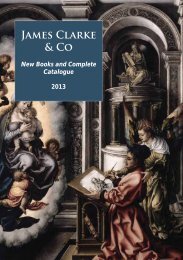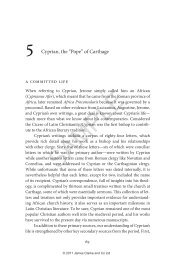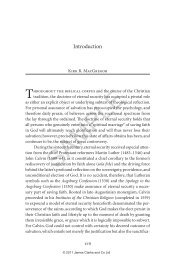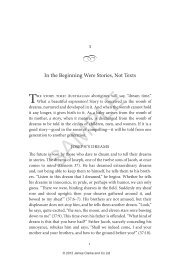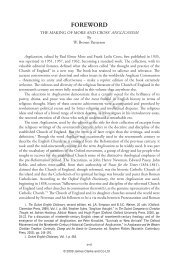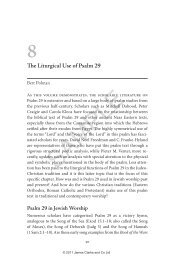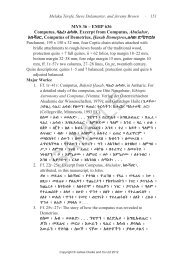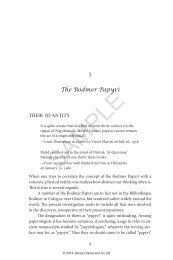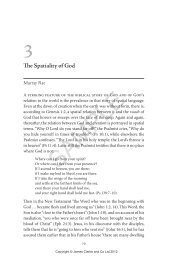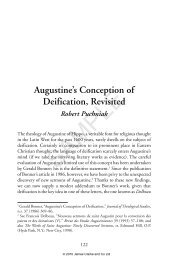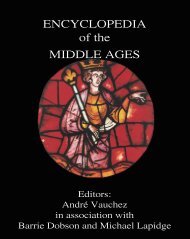Extract from Chapter 1 - James Clarke and Co Ltd
Extract from Chapter 1 - James Clarke and Co Ltd
Extract from Chapter 1 - James Clarke and Co Ltd
Create successful ePaper yourself
Turn your PDF publications into a flip-book with our unique Google optimized e-Paper software.
68 MUSING WITH CONFUCIUS AND PAUL<br />
As such the text of the Analects is a dao in the sense that it is a “guiding<br />
discourse.” The Chinese word dao means “to lead through [on foot]”<br />
“foremostly” (“head”). 35 The <strong>Co</strong>nfucian teachings in the Analects are<br />
guiding discourses (dao) of “human becoming”—in the dynamic <strong>and</strong><br />
relational process of change <strong>and</strong> persistence.<br />
The Analects does not speculate the genesis of the world, it “does<br />
something to the world <strong>and</strong> recommends how it should be.” 36 Because<br />
there is no creation myth in the Chinese worldview, <strong>Co</strong>nfucius <strong>and</strong> his<br />
disciples believe that tian (Heaven) is the creative order <strong>and</strong> the field of<br />
creatures. “There is no apparent distinction between the order itself, <strong>and</strong><br />
what orders it. . . . Tian is not just ‘things’; it is a living culture—crafted,<br />
transmitted, <strong>and</strong> now resident in a human community.” 37 The “ten thous<strong>and</strong><br />
things” (wanwu) <strong>and</strong> the human world are immanent of creativity<br />
<strong>and</strong> life; they are “at once continuous one with another, <strong>and</strong> at the same<br />
time, unique.” 38 A moral subjectivity, which is also the subjectivity of tian,<br />
distinguishes the human creature <strong>from</strong> other creatures. 39 The way of becoming<br />
human is to realize the way of tian, as one cultivates virtues in<br />
correlation with others.<br />
As we turn to the letter to the Galatians, we will notice sharp contrasts<br />
between Galatians <strong>and</strong> the Analects. The thesis of the Analects<br />
concerns the cultivation of one’s subjectivity, that is, one’s moral mind or<br />
one’s heart. 40 The Analects does not pursue the question of the Objective<br />
One, who is believed to provide a transcendental answer to the question<br />
“what causes the world to be here?” <strong>and</strong> consequently to provide the basis<br />
for the meaning of life. In the Analects, the world does not appear deceptive,<br />
<strong>and</strong> accordingly the Analects is not preoccupied with the why of the<br />
world. 41 Instead, the Analects as a teacher (ru) is concerned with “how<br />
to get on in the world”—“the way (dao) is made in the walking of it.” 42<br />
Thus, the language <strong>and</strong> the teaching are training grounds for readers <strong>and</strong><br />
learners to walk on the path of becoming human as they are being culti-<br />
SAMPLE<br />
35. Ibid., 45.<br />
36. Ibid.; emphases mine.<br />
37. Ibid., 47.<br />
38. Ibid., 30.<br />
39. Mou, Xinti Yu Xingti, 1:22–23.<br />
40. Mou, Zhongguo Zhexue De Tezhi, 16–27.<br />
41. Ames <strong>and</strong> Rosemont, Analects, 32.<br />
42. Ibid., 33.<br />
© 2008 <strong>James</strong> <strong>Clarke</strong> <strong>and</strong> <strong>Co</strong> <strong>Ltd</strong>



